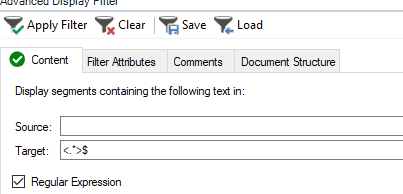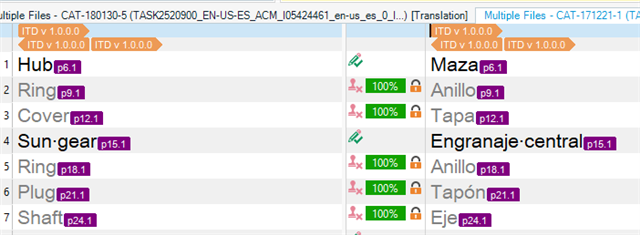Hi everyone!
I am a fanatic user of QA Checker 3.0->Regular Expressions feature. Since as of late I am working with Pretranslated Machine Translations which I have to edit, there are many embedded mistakes in the translation, so it's extremely useful to me to use custom Regular Expressions for checks.
For example, it's great to have a check that says that, if there are 5 consecutive digits, they should be split in order to use a space as a thousands separator. However, if there are only 4 digits, no thousands separator must be used.
That said, I find I have a problem with tags. Nothing I use seems to be able to detect or work with them. For example, if I want to check whether there IS some text in target NEXT TO A TAG (for example, "está a 3<TAG> de distancia" there is nothing I can do as far as I know).
It's funny that advanced display filter DOES detect tags in their regular expressions (for example I can filter target by <.*> and it will filter ALL segments including at least ONE tag (as tags are enclosed in <>". However, that trick does not work in QA->Regular Expressions.
Or am I mistaken?
And, if there is a limitation here, here's also an idea for a great improvement for the future!!! It must not be that complicated and would take QA Regular Expression Checks to the next level of usefulness!
Is there any way to mark as error, for example, any target segments that END in a tag?
I have tried this...
And it DOES not work. However, when used in Advanced Display Filter
It does a FANTASTIC job of filtering as expected (that is, segments ENDING in a tag)
So.. is there such a limitation in QA Checker that it's incapable of handling tags, or I am doing something wrong? Any ideas on how to create a Regular Expression check that handles tags? (for example, check if there is a target segment ENDING in a tag...)?
Thanks!

 Translate
Translate



